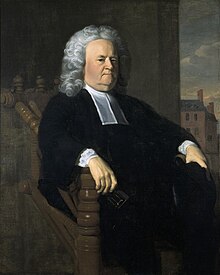TL;DR -- We now have the Heads covered up to the time of the Revolution and beyond. Everyone is gearing up for the celebrations (DAR, SAR, and others). We can look at that first period more closely now, say from the beginning to the split with England. Then, there will be a couple more periods: 1812's continuing conflict with England, the frontier (including the Civil War), and the latter part of the 19th century. We have already seen that Harvard's experiences match up well with our generational view that will be in the focus for a bit.
--
As we finish our look at the Heads of Harvard (Wikipedia), we will start to pull together a timeline that includes the threads here in terms of generations and add in information related to major themes which are influential today. Bringing in Edward Holyoke (Wikipedia) will allow us to look at the period before the Revolution. But there is an unexpected category to discuss: corporal punishment (see below).
Edward was of the fourth generation (WikiTree) of a family with a New England pedigree. His family had gone west and helped start Springfield in Hamden County. Edward went to Harvard and was associated for a couple of decades with a church in Marblehead (Essex County). Samuel Cheever had invited Edward to come be a Pastor.- History of Harvard (ours);
- History of the Presidency (Harvard);
- graduates of Harvard (list initiated by Hoar); and
- Harvard in the long history of the U.S.
- Samuel Adams (A.B. 1740), James Otis (A.B. 1743), Jonathan Mayhew (A.B. 1744), Thomas Cushing (A.B. 1744), James Bowdoin (A.B. 1745), John Hancock (A.B. 1754), John Adams (A.B. 1755), Joseph Warren (A.B. 1759) and Josiah Quincy Jr. (A.B. 1763).

No comments:
Post a Comment